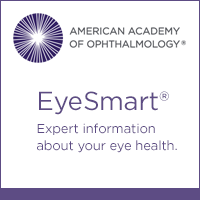
Laser Treatment
Diabetic retinopathy and glaucoma are often treated with laser therapy.
For diabetic retinopathy, the heat from the laser seals or destroys abnormal or leaking blood vessels located in the retina. The laser can be used to seal specific blood vessels or scattered to slow the growth of new abnormal blood vessels.
Laser treatment for diabetic retinopathy is usually not painful; although, the injection of the anesthetic may be uncomfortable. Laser treatment is an outpatient procedure; therefore, an overnight hospital stay is not required. However, you will need someone to drive you home after the procedure. Your eyes will be dilated and will remain so for several hours after the laser treatment. You will be asked to wear sunglasses to protect your eyes while they are still dilated.
For glaucoma, the effect of laser treatment is typically not permanent, and many patients will eventually require medications. The most common laser treatments for glaucoma are selective laser trabeculoplasty (SLT) and argon laser trabeculoplasty (ALT).

